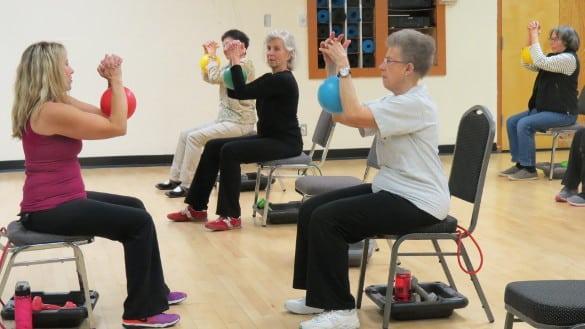 New blood pressure guidelines make American Heart Month the perfect time for a check-up. Courtesy photo
New blood pressure guidelines make American Heart Month the perfect time for a check-up. Courtesy photoFAMILY YMCA News:
February is American Heart Month, and as a leading community-based organization committed to improving the nation’s health, The Family YMCA urges everyone in Los Alamos to get a blood pressure screening.
Revised blood pressure guidelines from American Heart Association mean that nearly half of all Americans (46 percent) have high blood pressure.
High blood pressure is often referred to as “The Silent Killer” because there are typically no warning signs or symptoms.
To address the prevalence of heart disease, the Y has made a national commitment to the Million Hearts campaign, an initiative spearheaded by the U.S. Department of Health and Human Services, CDC and Centers for Medicare and Medicaid Services that aims to prevent one million heart attacks and strokes.
“There are many factors in keeping your heart healthy. Having a handle on your blood pressure and sodium intake are effective tools in the preventing heart disease,” Stacey Castille, Wellness Director, The Family YMCA said. “Whether you have high blood pressure, are at risk for heart disease or just want to keep your heart healthy the Y has resources that can help.”
The Y has numerous pieces of cardio equipment to suit everyone from beginning exercisers to highly trained athletes. Our wellness coaches can help you pick the piece of equipment that meets your needs. Castille said that if you are looking to make changes to your diet, schedule an appointment with the Y’s registered dietitian, Sara Pocernik. While high blood pressure and heart disease are serious conditions, said Castille, the good news is that a healthy heart is an achievable goal through lifestyle changes such as lowering sodium intake, eating healthier and getting more physical activity.
Reducing sodium intake is a one way to keep your heart healthy, said Castille. Per the American Heart Association (AHA), too much sodium in your system puts an extra burden on your heart and blood vessels. In some people, this may lead to or raise high blood pressure.
The AHA says that everyone, including kids, should reduce their sodium intake to less than 2,300 milligrams of sodium a day (about 1 teaspoon of salt). Having less sodium in your diet may help you lower or avoid high blood pressure.
In addition to programs and services offered in Los Alamos, the Y offers the following tips from the United States Department of Agriculture (USDA) to help reduce sodium in your diet.
- Think fresh: Most of the sodium Americans eat is found in processed foods. Eat highly processed foods less often and in smaller portions—especially cheesy foods, such as pizza; cured meats, such as bacon, sausage, hot dogs, and deli/luncheon meats; and ready-to- eat foods, like canned chili, ravioli and soups. Fresh foods are generally lower in sodium.
- Enjoy home-prepared foods: Cook more often at home—where you are in control of what’s in your food. Preparing your own foods allows you to limit the amount of salt in them.
- Fill up on veggies and fruits—they are naturally low in sodium: Eat plenty of vegetables and fruits—fresh or frozen. Eat a vegetable or fruit at every meal.
- Adjust your taste buds: Cut back on salt little by little—and pay attention to the natural tastes of various foods. Your taste for salt will lessen over time. Additionally, keep salt off the kitchen counter and the dinner table and substitute spices, herbs, garlic, vinegar or lemon juice to season foods.
- Boost your potassium intake: Choose foods with potassium, which may help to lower your blood pressure. Potassium is found in vegetables and fruits, such as potatoes, beet greens, tomato juice and sauce, sweet potatoes, beans (white, lima, kidney), and bananas. Other sources of potassium include yogurt, clams, halibut, orange juice and milk.
The Family YMCA offers a community of diverse individuals who can support all people in meeting their health and well-being goals. Learn more by visiting www.laymca.org or stopping into your local Y.
More About THE FAMILY YMCA: This charitable, nonprofit organization was established by volunteers in 1955 to address the need for a place where families could recreate together. In 2017, the donors to the Y’s annual campaign ensured that 300 people-200 children (86 in Y afterschool and camp) and 100 adults could participate in healthy activities.

